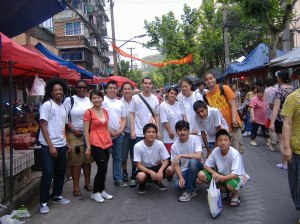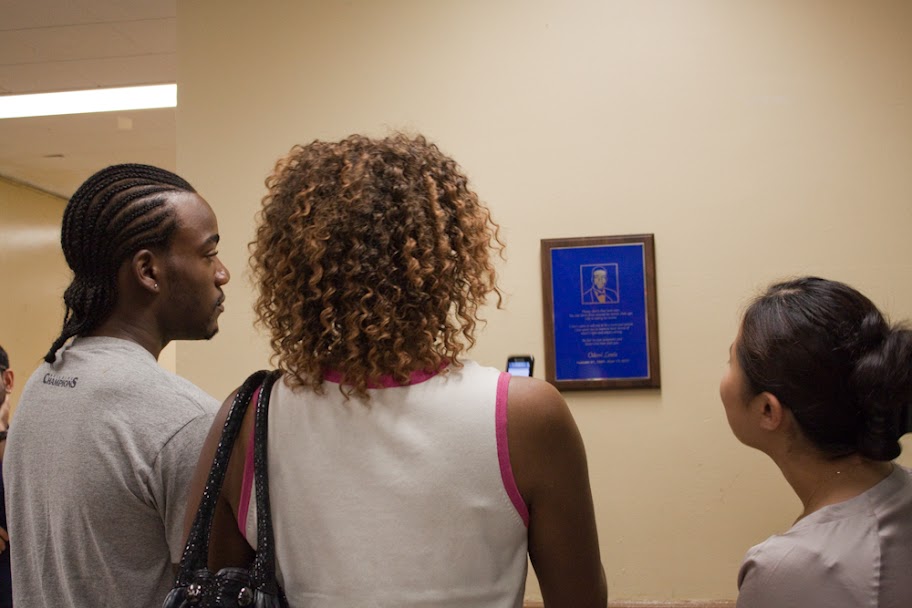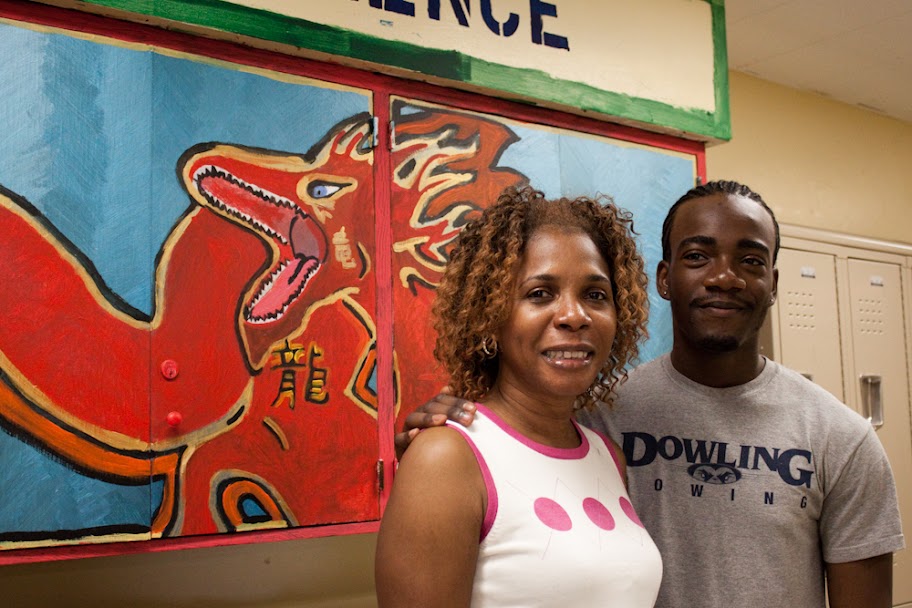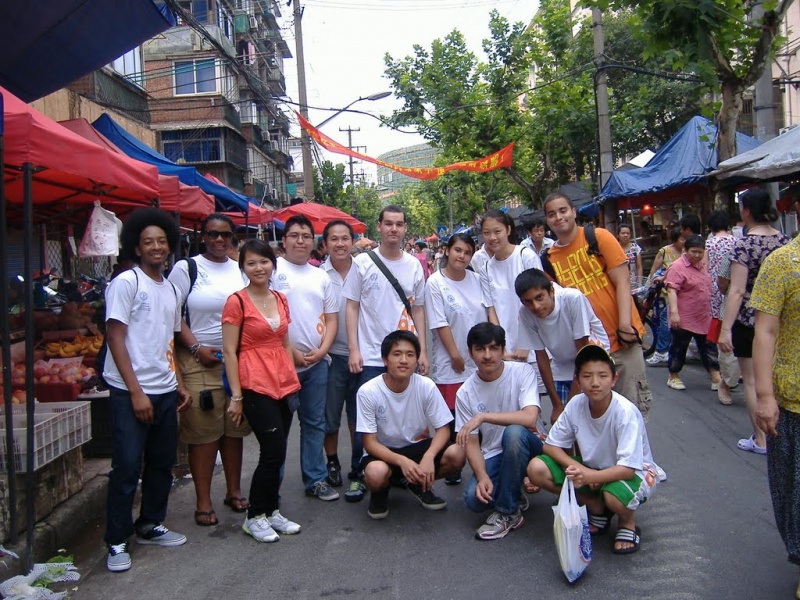Mr. Bantz writes:
JULY 22, 2011
Our time in China has come to an end. It feels like we have been in China forever, but once we are back home, it will seem as if it had gone by in a flash. Through each experience that the kids have had, they have slowly started their journey to becoming "China Experts." Our kids are taking in and absorbing so much about Chinese culture and internalizing it; they still know very little about what makes China tick, yet they are leaps and bounds beyond where they were 2 weeks ago.
I hope that these experiences will motivate our students to strive to improve their language skills. I was having so much fun learning new Chinese language expressions and trying to use them, but our students often appeared hesitant and self-conscious. We should all encourage them to overcome this awkward stage of language development (which many of us know all too well) by going for broke and pursuing every opportunity possible to use their Chinese language skills.

China 2011
Continue reading to start from the beginning of the trip!
View the full photo album.
JULY 10, 2011
Hello from Beijing!
Our group departed Newark Liberty International Airport on Saturday, July 9 and arrived in Beijing on Sunday, July 10 after a long, but smooth, non-stop flight that took us east over the Arctic Ocean, traveling north of the Nordic nations and then across Siberia, through Mongolia, and into China. I had mistakenly assumed we would be flying west over Alaska, as that is what I am accustomed to doing when flying to Japan.
Our 3 participating East-West students met up and traveled together with groups from 3 other schools: International High School at Sharpstown (Texas, 2 students and 1 chaperone participating), The Hill School (Pennsylvania, 11 students and 1 chaperone participating), and the Henry Street School of International Studies, which is located in Manhattan. 2 students from the Henry Street School are traveling together with our 3 East-West students as one group under my supervision.
 |
| Arrving at the Beijing airport |
After completing check-in and settling in, it was already time for dinner. We had dinner in the 2nd floor "restaurant" of the hotel, which looked more like a small banquet hall. We had a buffet-style dinner consisting of Chinese-only dishes. The students very cautiously tried the different foods that had been appealing enough for them to put on their plates. The students made lots of comments as they ate; comments were descriptive, such as, "I've never had tofu this texture before," "this pork dish is actually slices of pork belly, which is really just bacon," rather than indicative of likes and dislikes.We arrived in the gorgeous Beijing Airport and were greeted by Hanban staff. Students exchanged money, I purchased a local SIM card to use with the mobile phone I brought to China (thanks to Ms. Julia Cheng, Community Assistant at East-West), and we boarded a charter bus to our hotel. We received a long list of announcements and procedures to follow on the bus, and arrived at our hotel. The official name of the hotel is High-Tech Mansion BUPT. BUPT stands for Beijing University of Posts and Telecommunications, and the hotel is located on the edge of the campus.
JULY 11, 2011
Our first full day in China has come to an end. Everyone is doing well and things have been smooth. It's hard to believe that we only arrived yesterday as we have already done so much.
After breakfast at the hotel, we took our charter bus to Beijing's Hutong district. The Hutong district is reminiscent of typical old Beijing: residences are centered around courtyards, which are connected to each other by narrow alleyways which are only navigable by bicycle or on foot, creating maze-like neighborhoods (do a quick Google search for Hutong to find out more).

Bicycle rickshaws
We paired off and took bicycle rickshaws through the narrow streets of the Hutong area, where buses cannot travel. We were guided around a typical courtyard area, but the students were more interested in peering down the many narrow alleyways that we were not shown as we passed by in the bicycle rickshaw. We also visited the Beijing Confucius Temple, where the students appeared impressed by the traditional architecture of the temple complex buildings and the layout of the space between the buildings.
After a lunch of typical Chinese dishes shared by passing around a Lazy Susan, we visited the headquarters of Hanban, the sponsor of our trip. At Hanban, we explored interactive exhibits about Chinese culture; students generated paper-cut animals based on their birth year, tried on Peking Opera costumes, and rang old Chinese bells, among other activities.
We were later taken to the "Silk Market," a 6-story complex of vendors in stalls. For those familiar with downtown Flushing, you may like to think of it as a larger, more intense version of Busy Town Mall. Some of the students loved the market, while others were put off by its charged atmosphere. Workers at each stall aggressively tried to persuade people to shop at their stall. Our students who purchased items at the market did a good job of haggling; some students reported paying only 20%- 40% of the prices they had been quoted. Many items appeared to be knock-offs or pirated, despite signs throughout the store reminding vendors to "protect intellectual property rights."
After a dinner of typical Beijing foods (but no Peking duck), we arrived back at the hotel at 8:30 P.M. Wake-up calls are coming at 7 A.M. We will be visiting the Great Wall tomorrow!
JULY 12, 2011
We had a jam-packed day of sightseeing that ended with most of our students being sound asleep by 9:30 P.M. As you may be able to tell from the photos, the air here is not clear. Day and night, visibility is poor and you can stare directly at the sun without your eyes closing shut. Our guide insists that this is not smog or pollution, but fog, trapped in by the mountains and unable to escape. We had all been warned about the intense Chinese heat and humidity, but the temperature and humidity our first 2 days in Beijing were comparable to a hot summer day in New York, with the high temperature in the 80s yesterday and around 90 degrees today. We were hot and uncomfortable today, but we have not yet experienced the oppressive heat and humidity that we have been told about.
In the morning, we drove out to the Great Wall to an access point about 50 kilometers from Beijing. Our students had all been looking forward to visiting the Great Wall, but they were not prepared for the experience of climbing it (except for Chris, who visited the Great Wall last year). Our kids have seen countless images of the Great Wall and other famous places in the world, and have perhaps become a bit desensitized, knowing what things look like and not being impressed often enough by the real thing when they see it with their own eyes. The kids were all expecting to just look at and walk across the wall. As those who have visited the Great Wall already know, moving along the Great Wall on foot takes a great deal of climbing, with just a bit of walking.
Each student had a different physical limit as to how far he or she could climb; some students climbed for just a few minutes before reaching the limit of what was comfortable for them, while one climbed as high as time would allow. Our students were in awe at the sheer scale of the wall, and were blown away by how soon their legs became weak. What had first appeared to our students as an easy walk quickly became a challenge taken on by each to climb as high as possible. Our teenagers, who are not always easily impressed, were able to gain an understanding of and respect for the significance of the wall that goes beyond facts, dates, and photo opportunities.
We left the Great Wall at noon, had lunch, and visited a factory where copper vases and ornaments are made. By this time, the students were very tired and started to ask if it was almost time to have dinner and go to bed (it was only 2 P.M.). We got back into the bus and drove past the Olympic Village, Beijing Water Cube, and the "Bird's Nest" (I recommend an internet search for anyone unfamiliar with these Olympic structures). We continued on to the Summer Palace. We learned about the history of the Palace and toured the beautiful grounds. It was very impressive, but extremely crowded, and our visit coincided with the peak heat of the day. Students made comments about how amazing it was that the large lake on the grounds was dug out with the bare hands of men. One student felt she had been transported as she looked into the living quarters of the palace, which are preserved as they were 100 years ago.
JULY 13, 2011
Today was our 3rd and final full day in Beijing. We started the day with a visit to Tiananmen Square, best known by many of us for the demonstrations that were held in 1989. The square is massive and impressive, and Chairman Mao's large portrait creates a mood that instantly reminds one of some of China's milestones since the founding of the People's Republic of China. One student wanted to share what he knew about the protests of 1989 and asked me, "have you seen the YouTube video of the man in front of the tank?"
We proceeded into the Forbidden City, where many Chinese emperors once lived, isolated from the public. The Forbidden City is a large area made up of many ornate gates and grand courtyards, with buildings used most often by the emperors located deep in the interior. Our kids were interested to hear our historical lecture about how emperors used to live in the Forbidden City, but they were unable to fully take in the scenery of the courtyards. Today was the first day that we found ourselves in very uncomfortable heat and humidity, with strong sunshine to boot; it was very similar to a New York heat wave, with temperatures reaching into the 90s. We are told that the next city we will visit, Changsha, will be much hotter than it is now in Beijing.
We also visited the Temple of Heaven and watched a theatrical performance that combined dance and kung fu elements.
Some final notes:
- A man has been stationed at our breakfast hall, frying eggs to order. All the kids have tried them, and most of them have had one every day. We season the egg with soy sauce, vinegar, and Chinese spicy oil. Perfect way to start the day!

Chinese language classes
- In case you were wondering what we might do if someone suffered heat exhaustion (or worse- knocking on wood), we have had an ambulance follow us every day, everywhere we go. It follows our coach without fail, and keeps the flashing lights on to avoid getting separated.
- Beijing appears to be made up of many large boulevards, with multiple lanes for vehicular traffic in both directions, and fences or greenery islands dividing the traffic lanes from the bicycle lane, one each on opposite sides of the road, in addition to the sidewalk.
- On our second day in Beijing, we were asked not to "put toilet paper in the toilet." We were told to "put it in the garbage." Sure enough, at public restrooms, we found garbage cans next to the toilets. Yuck.
- As promised by Hanban, our stay here has been "strictly controlled." We have not had the chance to ride the subway or public bus, or even walk around and explore the city by foot. To Hanban's credit, they have packed a week's worth of sightseeing and activities into 3 days, taking us around the city in comfort on an air-conditioned coach bus.
JULY 16, 2011
We are having a great time here at Hunan University. We spent the entire day on the campus. We took a campus tour in the morning, and then we attended a general introductory lecture about China. Students then took placement tests for their Chinese language classes here. After dinner, we walked around the campus, going into campus stores and taking in the full atmosphere of the bustling campus. Some of our students were stopped by Chinese tourists who wanted to try speaking English with them (this university is very famous and historically significant in China and there are many tourists on some parts of the campus.)

Hiking
Campus life is new for most of our kids, and hopefully this experience will even have an impact on their college application choices.
Tomorrow we are visiting Chinese families for the "homestay experience." This is not a true homestay; small groups of students, with chaperones, will visit a Chinese family for half the day. In the evening we will attend an event near the campus.
JULY 20, 2011
Our last full day at Hunan University is over. Over the course of 7 days, our students have taken Chinese language classes, visited local Chinese families, gone shopping in the city, visited Mao ZeDong's childhood home, explored the university campus, played ping pong and badminton at the university gymnasium, walked along the Xiang Jiang River, and toured China's oldest academic institution, the Yuelu Academy, in addition to other activities too numerous to list.
Much of the moans, groans, and gripes that were heard during the first few days of the trip are things of the past; I no longer hear students complaining about the plumbing, pollution, reckless driving, or (insert complaint about China here). The students appear to have come to accept the China that they are experiencing for what it is, which is an important step for students coming from America.
After their final Chinese class, the kids all took an exam in Chinese. As I wrote previously, I have tried to learn Chinese with the kids during my stay here, and I took the exam with them, purely for my own personal enjoyment (I enjoyed it).

JULY 21, 2011
We have arrived in Shanghai, the third and last leg of our China trip. We were all amazed by what we saw today: a dynamic and vibrant city, different from the other 2 that we visited in China. Between the European influenced architecture, which helps us understand the city's past, and the breathtaking ultra-modern skyline of the Pudong District, which gives us a glimpse of what is to come in the near future, our students experienced sensory overload today. Our students agree that photos of Shanghai do not do it justice.
In addition to the architecture, our kids were also impressed by the vibrancy of the city. Even away from the city centers (just when we thought we had seen Shanghai's skyline, we kept passing areas that would easily be classified as city centers anywhere else), our students were fascinated by the ordinary goings on of the neighborhood surrounding our hotel. Our students, who often don't know where their food comes from or how it gets to their plates, were shocked to watch a chicken taken from its cage, slaughtered with one stroke of a machete, dropped into a large urn until it stopped moving, and then dipped in boiling water to prepare for having its feathers plucked.
We saw far more bicycles and motorbikes than we did in Beijing or Changsha, and the bicycles that we did see came in more shapes and configurations than we had imagined. We are excited to see more of the city tomorrow, our last full day here in China.
JULY 22, 2011
Our time in China has come to an end. It feels like we have been in China forever, but once we are back home, it will seem as if it had gone by in a flash. Through each experience that the kids have had, they have slowly started their journey to becoming "China Experts." Our kids are taking in and absorbing so much about Chinese culture and internalizing it; they still know very little about what makes China tick, yet they are leaps and bounds beyond where they were 2 weeks ago.
I hope that these experiences will motivate our students to strive to improve their language skills. I was having so much fun learning new Chinese language expressions and trying to use them, but our students often appeared hesitant and self-conscious. We should all encourage them to overcome this awkward stage of language development (which many of us know all too well) by going for broke and pursuing every opportunity possible to use their Chinese language skills.
Parents, please be sensitive in your comments to your children about their language skills. During the course of our stay here, local Chinese students and other American students have made seemingly innocent comments about some of our students' Chinese language abilities, in a joking and friendly way. Our students laugh back and smile, but then avoid speaking Chinese for days at a time. These comments are potentially hurtful and detrimental to our kids. Generally speaking, our kids are at a point where they do not believe that they deserve praise for their limited language skills. At the same time, they will take to heart and fixate on every error pointed out. Realizing that they have successfully communicated with someone in Chinese gives them satisfaction and confidence, rather than praise or comments about their Chinese.
Throughout 2 weeks here, our group has morphed into different configurations. While all societies have groups, East Asian societies are all about groups and how people relate to each other within and between groups. We started with one group of 5 students: 3 East-West students, and 2 students from the Henry Street School of International Studies. At first, the students from the 2 different schools didn't really know each other. When they met the students from the other American schools, they were leery of each other. Those groups from 7 different schools became "Group A," a group of 37 students. Within 3-4 days, the Group A students had a distinct identity from Groups B and C, who also were part of our larger summer camp group. When we traveled from Beijing to Hunan, only 2 staff members traveled with us (one from Hanban and one from Hunan University). Those 2 staff members suddenly seemed so close and familiar when we arrived in Hunan to meet a whole new set of camp staff. When the students were placed in language classes, they created new groups and group dynamics. So on and so forth, our students continually became closer to the people most familiar to them, modifying relationships within the group.
Here are some final pictures from our stay here in China. Facebook is banned in China, so these pictures have not been posted by our students yet. One picture is of a motorbike pet shop. You can see a kitten, rabbits, and other animals attached to the bike. Each individual straw basket contains a large cicada eager to escape. Our students hope that animal welfare will increase in priority in China.















